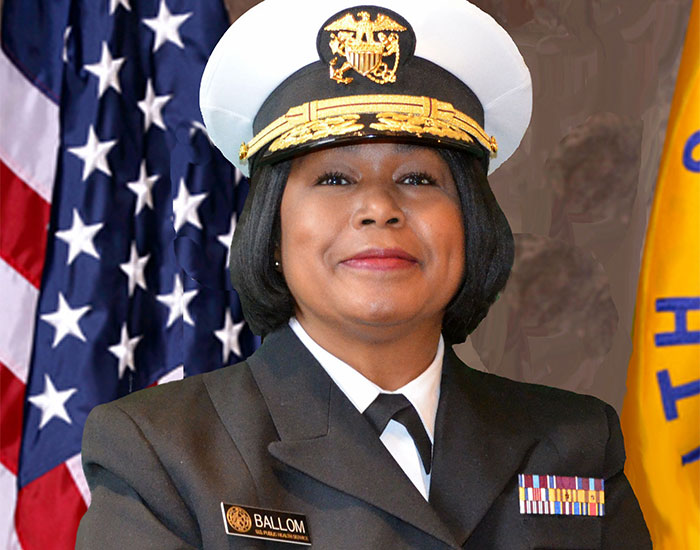TCOM alum serves her country as U.S. Assistant Surgeon General
By Alex Branch

Dr. TeCora Ballom’s path to becoming U.S. Assistant Surgeon General started more than 30 years ago as a student at the Texas College of Osteopathic Medicine.
A recipient of a National Health Service Corps scholarship, the Dallas native was drawn to TCOM by the school’s emphasis on caring for medically underserved communities.
“I was always certain that it was my calling to provide medical care for vulnerable and underserved populations,” said Ballom, DO, a 1984 graduate. “The school equipped me with the knowledge, skills and confidence to pursue my goals.”
As a commissioned officer in the U.S. Public Health Service, Dr. Ballom’s passion for delivering care to underserved communities earned her a promotion to Rear Admiral and appointment to Assistant Surgeon General. She will continue her current role as Regional Medical Director for the U.S. Federal Bureau of Prisons but also will now support health service special projects and emergency responses.
Nationwide, there are about 40 Assistant Surgeon Generals, who report to the U.S. Surgeon General. Assistant Surgeon Generals are chosen to lead responses to events such as Hurricane Katrina, the Ebola outbreak or the Flint, Mich., water crisis.
The U.S. Public Health Service Commissioned Corps is a uniformed service along with the Army, Navy, Air Force, Marines, Coast Guard and National Oceanic and Atmospheric Administration, and it has almost 7,000 corps members.
“The Corps is often referred to as one of the nation’s best kept secrets and is a great opportunity to serve the country,” Dr. Ballom said. “I’m very pleased to have the opportunity to take on leadership roles in some high-profile and challenging projects.”
In her role in the federal prison system, Dr. Ballom oversees medical care for 16 prisons and 30,000 inmates in the five-state region of Texas, Oklahoma, Arkansas, New Mexico and Louisiana.
Many prison inmates come from lower socioeconomic backgrounds and environments where they had poor or limited access to health care, Dr. Ballom said.
“We see prisoners with mental health concerns, chronic illnesses and infectious diseases that were perhaps never treated before,” Dr. Ballom said. “It creates a lot of challenges, but I enjoy trying to solve challenges and find ways to improve these patients’ health.”
The profession of osteopathic medicine has historically provided high quality, compassionate medical care to vulnerable and rural populations, Dr. Ballom said. She believes current TCOM students must continue to fill that need.
“It is important not to abandon that heritage,” she said. “Whatever path you choose, seek to make a difference for as many people as you can.”






Social media